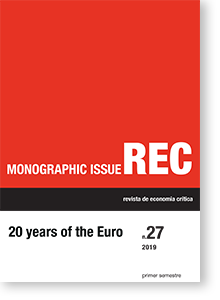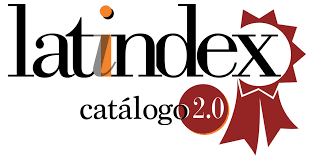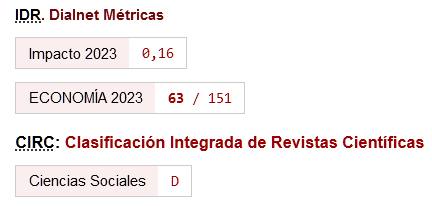Economic and political aspects of the persisting crisis in Southern Europe
Resumen
‘Globalist’ discourse became largely hegemonic in our cultural environment, one of the consequences of such hegemony, albeit mostly a performative one, being the crisis of nation-state and sovereignty. This nadir of sovereignty really expresses and reinforces a political process of mass disfranchisement, whereby democratic institutions are rendered irrelevant. The Euro experiment and the correspondent ‘Europeanist’ discourse ought to be understood fundamentally within this generic frame, although with a number of important specificities.
Meanwhile, a big economic crisis has deeply injured the social fabric of most Southern Europe countries, worsening Euroland’s regional discrepancies and producing a situation of seemingly permanent ‘zero-growth’ for various countries, namely Italy, Greece and Portugal. This can, however, become an occasion to interrupt the dogmatic slumber induced by Europeanism, a discussion that directly implies the consideration of multiple political aspects, relevant not only for the countries more directly impoverished, but really to all Eurozone members.
This paper regards the evolution of various southern European economies since the beginning of this century, with particular emphasis on the Portuguese case, and suggests a confrontation with aspects referring to political attitudes.
Descargas
Citas
Amaral, João Ferreira do (2013): *Porque Devemos Sair do Euro, O Divórcio Necessário para Tirar Portugal da Crise*, Lisboa: Lua de Papel.
Amaral, João Ferreira do (2014): *Em Defesa da Independência Nacional*, Lisboa: Lua de Papel.
Estadísticas económicas, Banco de Portugal: [http://www.bportugal.pt/EstatisticasWEB/(S(vsskmqu2rceg3qmzvwzesemr))/SeriesCronologicas.aspx](http://www.bportugal.pt/EstatisticasWEB/(S(vsskmqu2rceg3qmzvwzesemr))/SeriesCronologicas.aspx)
Estadísticas económicas, OECD: [http://stats.oecd.org/](http://stats.oecd.org/)
Estadísticas económicas, Eurostat, Comisión Europea: [http://epp.eurostat.ec.europa.eu/portal/page/portal/statistics/search_database](http://epp.eurostat.ec.europa.eu/portal/page/portal/statistics/search_database)
Estadísticas del Eurobarómetro, informes Flash Eurobarómetro: [http://ec.europa.eu/public_opinion/archives/flash_arch_en.htm](http://ec.europa.eu/public_opinion/archives/flash_arch_en.htm)
Graça, João Carlos, João Carlos Lopes & Rafael Marques (2011): "The European Sovereign Crisis: the Portuguese Case", *Boletín de Sociología Económica*, Volumen12, pp. 38-47: [http://econsoc.mpifg.de/archive/econ_soc_12-3.pdf](http://econsoc.mpifg.de/archive/econ_soc_12-3.pdf)
Krugman, Paul (2012a), "Exit and exports", *The New York Times*, 14 de mayo: [https://krugman.blogs.nytimes.com/2012/05/14/exit-and-exports/](https://krugman.blogs.nytimes.com/2012/05/14/exit-and-exports/)
Krugman, Paul (2012b), "More on Greek and Argentine Exports", *The New York Times*, 15 de mayo: [https://krugman.blogs.nytimes.com/2012/05/15/more-on-greek-and-argentine-exports/?src=tp](https://krugman.blogs.nytimes.com/2012/05/15/more-on-greek-and-argentine-exports/?src=tp)
Lapavitsas, Costas, Kaltenbrunner, A., Lindo, D., Michell, J., Painceira, J.P., Pires, E., Powell, J., Stenfors, y Teles, N. (2010a), *Eurozone Crisis: Beggar Thy Self and Thy Neighbour*, Research on Money and Finance (RMF): [http://eprints.uwe.ac.uk/23045/1/fullreport.pdf](http://eprints.uwe.ac.uk/23045/1/fullreport.pdf)
https://doi.org/10.1080/19448953.2010.510012
Lapavitsas, Costas, Kaltenbrunner, A., Lambrinidis, G., Lindo, D., Meadway, J., Michell, J., Painceira, J.P., Pires, E., Powell, J., Stenfors, y Teles, N. (2010b), *The Eurozone between Austerity and Default*, Research on Money and Finance (RMF): [http://syllogika.pbworks.com/w/file/fetch/45360374/RMF-Eurozone-Austerity-and-Default.pdf](http://syllogika.pbworks.com/w/file/fetch/45360374/RMF-Eurozone-Austerity-and-Default.pdf)
Lapavitsas, Costas, Kaltenbrunner, A., Lindo, D., Meadway, J., Michell, J., Painceira, J.P., Pires, E., Powell, J., Stenfors, A. y Teles, N. (2011), *Breaking Up? A Route Out of the Eurozone Crisis*, Research on Money and Finance (RMF): [https://www.researchgate.net/publication/271215457_Breaking_up_A_Route_Out_of_The_Eurozone_Crisis](https://www.researchgate.net/publication/271215457_Breaking_up_A_Route_Out_of_The_Eurozone_Crisis)
Luna-Arocas, Roberto, Guzmán, G. Quintanilla, I y Farhangmehr, M. (2001): "The Euro and European Identity: The Spanish and Portuguese Case", *Journal of Economic Psychology*, 22(4), pp. 441-460, febrero.
https://doi.org/10.1016/S0167-4870(01)00045-9
Rodrigues, João (2019), *O Euro do Nosso Descontentamento*, [http://saladeimprensa.ces.uc.pt/?col=opiniao&id=23588#.XHrAAO83app](http://saladeimprensa.ces.uc.pt/?col=opiniao&id=23588#.XHrAAO83app) y [http://ladroesdebicicletas.blogspot.com/2019/02/oeuro-do-nosso-decontentamento.html](http://ladroesdebicicletas.blogspot.com/2019/02/oeuro-do-nosso-decontentamento.html)
Sapir, Jacques (2013): *Faut-il sortir de l'Euro?*, París: Seuil.
Sapir, Jacques (2014), *Entretien avec Jacques Sapir : la sortie de l'euro nécessaire*, [http://www.agoravox.tv/actualites/economie/article/entretien-avec-jacques-sapir-la-40009](http://www.agoravox.tv/actualites/economie/article/entretien-avec-jacques-sapir-la-40009)
Stiglitz, Joseph (2016): *The Euro: How a Common Currency Threatens the Future of Europe*, NY/London: W. W. Norton & Company.
Streeck, Wolfgang (2014): *Du Temps Acheté: La Crise sans Cesse Ajournée du Capitalisme Démocratique*, Paris: Gallimard.
Streeck, Wolfgang (2016): "Why the Euro divides Europe" in W. Streeck, *How Will Capitalism End: Essays on a Failing System*, Brooklyn, NY: Verso, pp. 165-183.
Weisbrot, Mark & Juan Antonio Montecino (2012), "More Pain, No Gain for Greece: Is the Euro Worth the Costs of Pro-Cyclical Fiscal Policy and Internal Devaluation?", Center for Economic and Policy Research, Washington, D. C.: [http://cepr.net/documents/publications/greece-2012-02.pdf](http://cepr.net/documents/publications/greece-2012-02.pdf)
Descargas
Publicado
Cómo citar
Número
Sección
Licencia
Esta licencia permite a terceros compartir (copiar y redistribuir el material en cualquier medio o formato) y adaptar (remezclar, transformar y crear a partir del material para cualquier finalidad, incluso comercial), siempre que se reconozca la autoría y la primera publicación en esta revista (La Revista, DOI de la obra), se proporcione un enlace a la licencia y se indique si se han realizado cambios en la obra.







